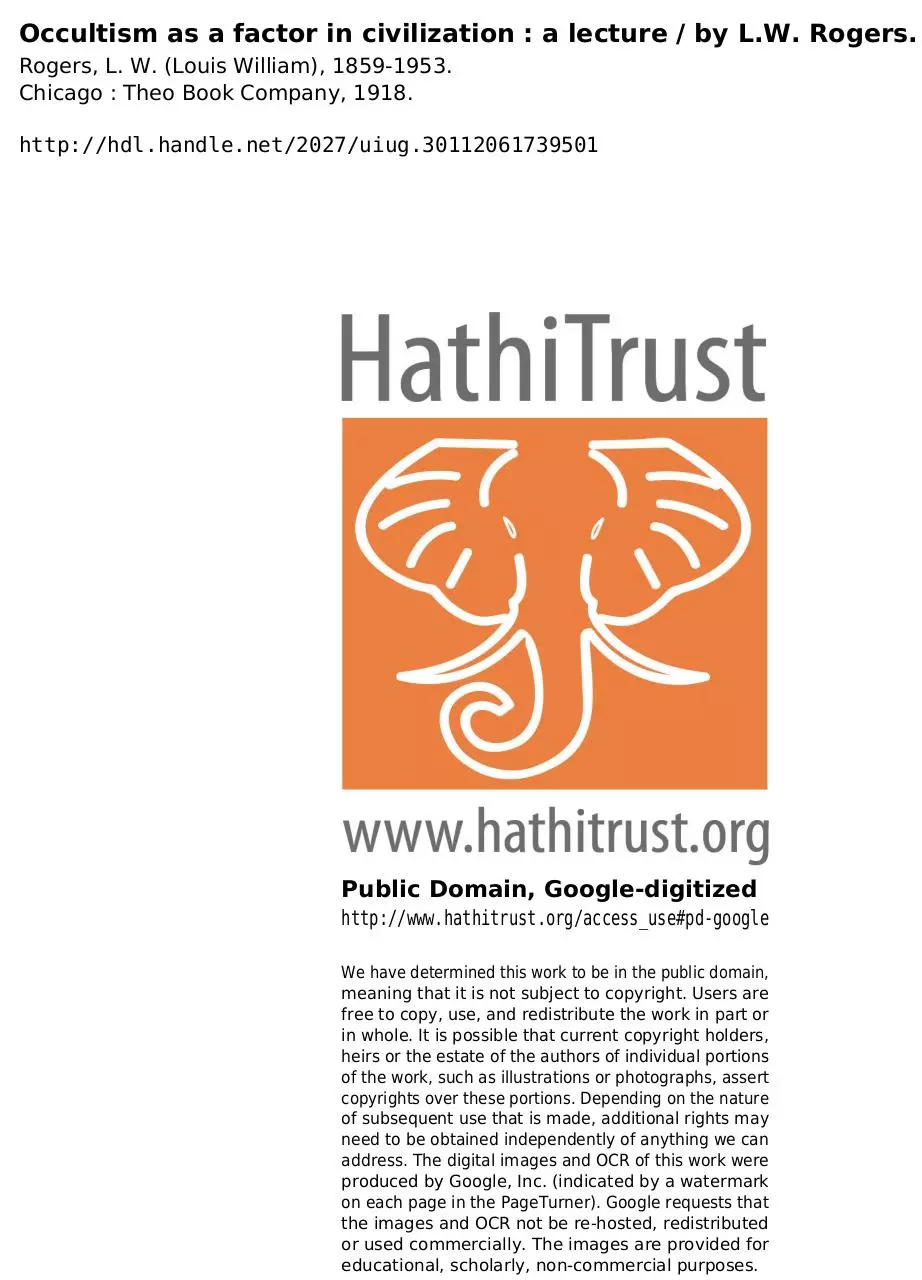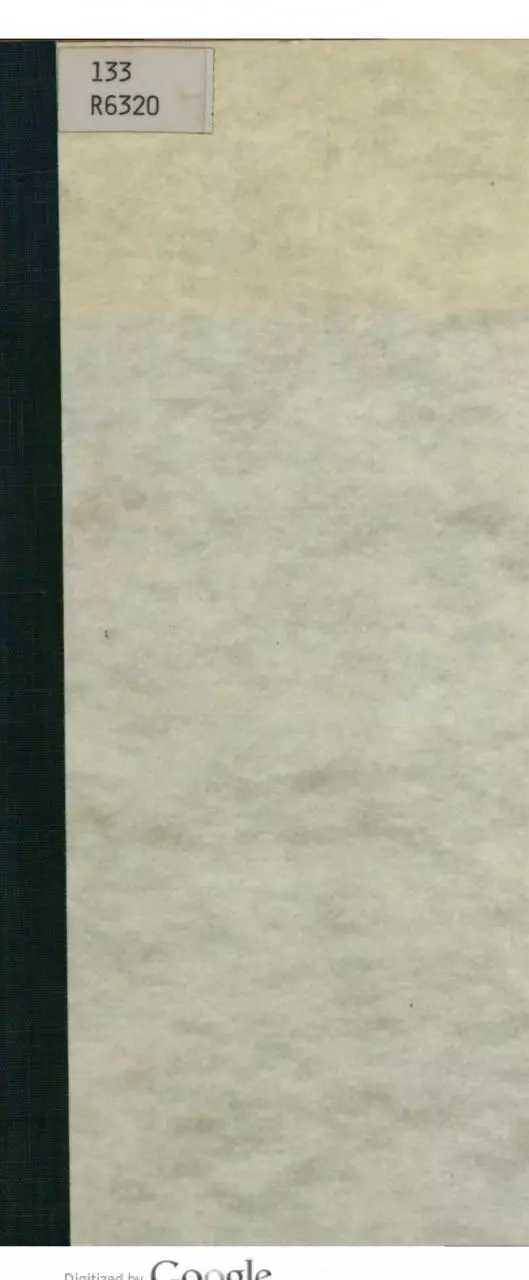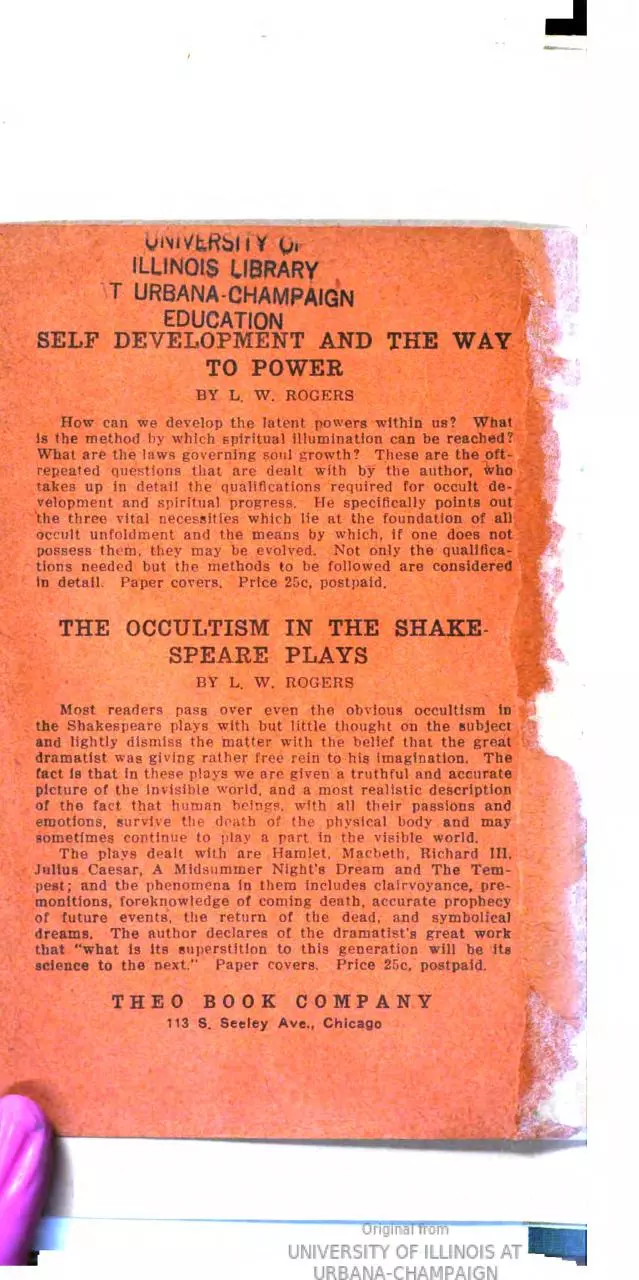Occultism as a factor in civilization cropped (PDF)
File information
Title: Occultism as a factor in civilization : a lecture / by L.W. Rogers.
Author: Rogers, L. W. (Louis William), 1859-1953.
This PDF 1.4 document has been generated by HathiTrust / iText® 5.2.0 ©2000-2012 1T3XT BVBA, and has been sent on pdf-archive.com on 19/07/2016 at 11:36, from IP address 192.96.x.x.
The current document download page has been viewed 546 times.
File size: 5.51 MB (29 pages).
Privacy: public file





File preview
Occultism as a factor in civilization : a lecture / by L.W. Rogers.
Rogers, L. W. (Louis William), 1859-1953.
Chicago : Theo Book Company, 1918.
http://hdl.handle.net/2027/uiug.30112061739501
Public Domain, Google-digitized
http://www.hathitrust.org/access_use#pd-google
We have determined this work to be in the public domain,
meaning that it is not subject to copyright. Users are
free to copy, use, and redistribute the work in part or
in whole. It is possible that current copyright holders,
heirs or the estate of the authors of individual portions
of the work, such as illustrations or photographs, assert
copyrights over these portions. Depending on the nature
of subsequent use that is made, additional rights may
need to be obtained independently of anything we can
address. The digital images and OCR of this work were
produced by Google, Inc. (indicated by a watermark
on each page in the PageTurner). Google requests that
the images and OCR not be re-hosted, redistributed
or used commercially. The images are provided for
educational, scholarly, non-commercial purposes.
LIBRARY OF THE
UNIVERSITY OF ILLINOIS
T URBANA-CHAMPAICN
MERTEN J. MANDEVILLB
COLLECTION IN PARAPSYCHOLOGY
AND OCCULT SCIENCES
EDUCATION
'
QWNthII'Y Ur
ILLINOI$ LIBRARY
T URBANA-CHAIVIPAIGN
EDUCATION
:
SELF DEVELOPMENT AND THE WAY
TO POWER
BY L, W. ROGERS
How can we develop the latent powers within us? What
Is the method by which spiritual Illumination can be reached?
What are the laws governing soul growth? These are the oft- I,
repeated questions
that are dealt with by the author, who -'
takes up in detail the qualifications required
for occult de
velopment and spiritual progress.
He specifically points out
‘the three vital necessities
which lie at the foundation of all
occult untoldment and the means by which. If one does not 7
possess them, they may be evolved.
Not only the qualifica-I
tions needed but the methods to be followed are considered
In detail. Paper covers.
Price 250, postpaid.
.
THE OCCULTISM IN THE SHAKE
SPEARE PLAYS
BY
t
,
'
L_
W. ROGERS
Most readers pass ever even the obvious occultism In
the Shakespeare plays with but little thought on the subject
and lightly dismiss the matter with the belief that the great
dramatist was giving rather free rein to his Imagination. The
fact is that In these plays we are given a truthful and accurate
picture of the Invisible world, and a most realistic description
of the fact that human beings, with all their passions and
survive the death of the physical body and may
emotions,
sometimes continue to play a part in the visible world.
The plays dealt with are Hamlet. Macbeth, Richard Ill.
Julius Caesar, A Midsummer Night’s Dream and The Tem
pest; and the phenomena In them includes clairvoyance, pre
monitions, foreknowledge of coming death, accurate prophecy
of tuture events, the return of the dead; and symbolical
The author declares oI.’ the dramatist's great work
dreams.
that “what is Its superstition to this generation will be Its
Paper covers.
Price 25c. postpaid.
science to the next."
THEO BOOK COMPANY
113
S, Seeley
Ave.,
Chicago
,;
l
t
OCCULTISM AS A FACTOR
IN CIVILIZATION
QQQ
"Why is India, where the acceptance of occultism
general, so far behind us in civilization?"
This question is repeatedly asked
tical about the beneficent results of
and it deserves a. careful answer.
fact, behind us in civilization, and,
acceptance of occultism the cause?
is so
by those who are skep
a belief in things occult,
Is India, as a matter of
if so, is the widespread
of the world represent two dis
‘ The present civilizations
tinct phases of human evolution. One is the outer, the ob
jective, the active. The other is the subjective, the thought
ful, the philosOphical.
America is typical of the one and
India of the other.
There is no more reason why two civilizations, representing
differing phases of development, should quarrel about these
differences, than there is for the musician to object to the
qualities being evolved by the mathematician.
It is just as
absurd for a. nation that is giving pronounced attention to
material advancement to decry another that is equally ab
sorbed with inner development, as for the carpenter, who
leads a physically active life, to grumble at the author, who
follbws the opposite course.
The true relationship is this:
the author needs the house the carpenter can build, while the
carpenter no less needs the books the author can write. And
so it is with the civilization of the occident and the orient.
....-.-| .l
J=J=m\_m-m
The orient needs the
Each has something the other needs.
lessons our civilization furnishes in commercial organization
We need, even more, the lessons of
and material enterprise.
oriental serenity and philosophical adjustment to environment.
The
Such reciprocity is the very foundation oi? civilization.
perfect exchange becomes throughout the world, the
higher becomes the type of civilization.
In exact proportion
that the various pe0ples of the earth exchange the material
products of the soil, the intellectual gains in art and science.
and the moral achievements in the evolution of human vir
tues, civilization approaches perfection.
more
When we consider that phase of civilization represented by
material development there can be no question about the oc
cident leading the orient.
But let us see if there are not
reasons for this, lying entirely outside the matter of religious
belief. India and America may be taken as perhaps the highest
expressions of these differing civilizations, the thoughtful and
the active. Now what is their relative opportunity for ma
terial development and commercial success?
We have in the United States an area of about three and
one-hallI million square miles, with a population of a little
more than a hundred million people. We have most wonder
ful natural resources—practically
inexhaustible deposits of
coal, of petroleum, and of iron. We have gold, silver, copper
and lead in widely distributed abundance,
and immense pine
forests for cheap and rapid building. We have a virgin soil
as fertile as the sun shines upon and a diversified climate
admirably adapted to the production of almost every staple
of commerce.
We are between the two greatest oceans. di
rectly in the pathway of developing civilization, with the orient
almost as near as Europe, with the markets of the world at
our doors.
in the very nature of things we must be materiai~
ly successful.
lndia, on the contrary, has almost none of these natural
ad
2
o!
mnM-._._u_.-r_~-
.. z... - »
'g"’-'
. .
,4. v..u!.' l‘?.!
.>_'_
sax;
Lu“
---.- v
if
is
a
a
great com
vantages, almost none of these potent factors of
mercial civilization.
She has an area of but about one and
population of three
one-half million square miles, with
hundred million people to support. Her soil has been tilled
for ages and her climate is commercially as bad as ours is
excellent. In some portions the rainfall averages but six
wholly inadequate for growing
inches per annum, which
crops, while in other sections it reaches an average of two
precipitated at one
hundred
inches per annum, which,
time, would be the equivalent of a lake covering the country
to a depth of sixteen feet. Her commercial location is the re
verse of our own.
On the north is the impassable barrier of
the Himalayas, lifting their crests of eternal snow more than
twenty-five thousand feet above the level of the sea. On the
east is China and on the west the unimportant country of
Persia. India could not well be more remote from the mar
kets of the world. Add to all this the fact that instead of
being a united people speaking a single language—a matter of
incalculable importance in material development—the peeple
of India are separated by castes, customs and traditions and
speak more than forty different languages, and we certainly
have excellent reasons why India is behind us in that part of
civilization represented by material progress and commercial
wealth.
3
it
a
a
The relative opportunity of the two countries to achieve
material success may be put fairly by likening America to
plot of seven acres of fertile soil, close to a good market, with
a. family of only- three to support.
If that represents Amer
plot of three acres,
ica, then India would be represented by
remote from market, upon which a. family of nine must be
Make allowance also for the differences in nat
sustained.
is easy to see that
ural resources, climate and rainfall, and
the very people who could become rich on the one might be
doomed to perpetual poverty on the other, and that religious
belief would have nothing whatever to do with it. We Amer
are the legatees of nature, with such an opportunity
great material civilization as the world has never before
seen.
It would be strange indeed were we. not successful in
that direction.
icans
for
a
But is material development
civilization?
is there not
something else to be considered in any civilization worthy the
name?
What is the essence of this thing we call civilization?
It is the elimination of barbarity and brutality from the race.
It is a condition of peace as opposed to violence.
it is the
renunciation of brute force and the enthroning of reason.
Perhaps on first thought we of the occident would say that
our civilization answers to the definition; that our “Christian
nations" excel in these things also as well as in material de
velopment.
But what are the facts? Does our occidental civ
ilization really represent “a condition of peace as opposed to
violence," or is its history a record of brutal warfare?
Look back over the history of England, our own national
parent.
I do not for a moment forget her great part in the
drama of civilization.
Her role has sometimes been heroic.
but it has also been cruel, despotic and immoral.
Read the
history of the Opium War. When we think of the opium evil
we are apt to censure the Chinese.
As a matter of fact, Eng
land forced the opium trade upon China at the point of the
bayonet.
Until 1773 opium was used in China only medicin
ally, and but two hundred chests per annum were imported.
None, or almost none. was grown.
Then the English East
India Company saw in the vile drug an opportunity for great
profit, and within three years the importation increased five
In 1796 the Chinese emperor attempted to check the
fold.
rapidly growing evil.
He proclaimed severe penalties for
opium smoking.
These were gradually increased in severity
But nothing
until capital puninshment was finally decreed.
All
proved effective against the rising tide of debauchery.
this time, while the "heathen" emperor was doing his utmost
to check the growing evil, the "Christian" occidentals were
4
Download Occultism as a factor in civilization cropped
Occultism as a factor in civilization_cropped.pdf (PDF, 5.51 MB)
Download PDF
Share this file on social networks
Link to this page
Permanent link
Use the permanent link to the download page to share your document on Facebook, Twitter, LinkedIn, or directly with a contact by e-Mail, Messenger, Whatsapp, Line..
Short link
Use the short link to share your document on Twitter or by text message (SMS)
HTML Code
Copy the following HTML code to share your document on a Website or Blog
QR Code to this page

This file has been shared publicly by a user of PDF Archive.
Document ID: 0000401878.